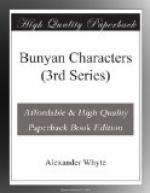Mr. Prywell’s most private and not at all professional
papers—papers evidently, and on the face
of them, connected with the state of the spy’s
own soul—came into my hands as good lot
would have it just the other night. The moth-eaten
chest was full of his old papers, but the pieces that
took my heart most were, as it looked to me, actually
gnashed through with his remorseful teeth, and soaked
and sodden past recognition with his sweat and his
tears and his agonising hands. But after some
late hours over those remnants I managed to make some
sense to myself out of them. There are some parts
of the parchments that pass me; but, if only to show
you that this arch-spy’s so vigilant jealousy
was not all directed against other people’s bad
hearts and bad habits, I shall copy some lines out
of the old box. ’Have I penitence?’
he begins without any preface. ’Have I
grief, shame, pain, horror, weariness for my sin?
Do I pray and repent, if not seven times a day as
David did, yet at least three times, as Daniel?
If not as Solomon, at length, yet shortly as the
publican? If not like Christ, the whole night,
at least for one hour? If not on the ground and
in ashes, at least not in my bed? If not in
sackcloth, at least not in purple and fine linen?
If not altogether freed from all, at least from immoderate
desires? Do I give, if not as Zaccheus did, fourfold,
as the law commands, with the fifth part added?
If not as the rich, yet as the widow? If not
the half, yet the thirtieth part? If not above
my power, yet up to my power?’ And then over
the page there are some illegible pencillings from
old authors of his such as this from Augustine:
’A good man would rather know his own infirmity
than the foundations of the earth or the heights of
the heavens.’ And this from Cicero:
’There are many hiding-places and recesses in
the mind.’ And this from Seneca: ’You
must know yourself before you can amend yourself.
An unknown sin grows worse and worse and is deprived
of cure.’ And this from Cicero again:
’Cato exacted from himself an account of every
day’s business at night’; and also Pythagoras,
’Nor let sweet sleep upon
thine eyes descend
Till thou hast judged its deeds
at each day’s end.’
And this from Seneca again: ’When the light
is removed out of sight, and my wife, who is by this
time aware of my practice, is now silent, I pass the
whole of my day under examination, and I review my
deeds and my words. I hide nothing from myself:
I pass over nothing.’ And then in Mr.
Prywell’s boldest and least trembling hand:
’O yes! many shall come from the east and the
west and shall sit down with Abraham and Isaac and
Jacob in the kingdom of heaven, when many of the children
of the kingdom shall be cast out. O yes.’
Now, this ‘O yes!’ Miss Peacock tells
us, is the Anglicised form of a French word for our
Lord’s words, Take heed how ye hear!




